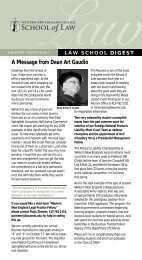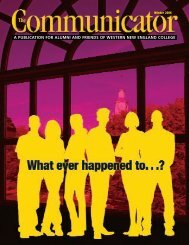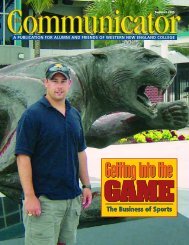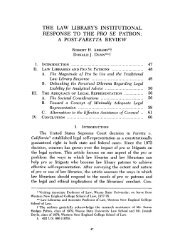legal education and the twenty-first century - Western New England ...
legal education and the twenty-first century - Western New England ...
legal education and the twenty-first century - Western New England ...
You also want an ePaper? Increase the reach of your titles
YUMPU automatically turns print PDFs into web optimized ePapers that Google loves.
1997] OUR CALLING TO FULFILL<br />
Our critique must be more than a critique of law <strong>and</strong> <strong>the</strong> identification<br />
of racism <strong>and</strong> sexism. It must be a critique of <strong>the</strong> formation of<br />
ideas <strong>and</strong> <strong>the</strong> development of <strong>the</strong>ories of learning. 19 We must cultivate<br />
a discourse that addresses <strong>the</strong> fundamental reason for law <strong>and</strong><br />
lawyers in society. We must nurture a methodology that combines<br />
intellect, spirit, <strong>and</strong> body. I believe this goal is accomplished<br />
through a holistic model of <strong>legal</strong> <strong>education</strong>. 20<br />
In my role as dean at Nor<strong>the</strong>astern University School of Law, I<br />
strive to lead <strong>the</strong> institution according to this model <strong>and</strong> <strong>the</strong>se val<br />
19. Traditional <strong>legal</strong> educators emphasize <strong>the</strong> value of "school-centered learning."<br />
Brook K. Baker, Beyond MacCrate: The Role of Context, Experience, Theory,<br />
<strong>and</strong> Reflection in Ecological Learning, 36 ARIZ. L REv. 287, 288 (1994). The underlying<br />
premise of school-centered learning is <strong>the</strong> belief that "to know something requires<br />
<strong>the</strong> learner to be separated, or distanced from <strong>the</strong> situated experience .... Schools are<br />
often referred to as places where people learn out of context, learn general concepts, or<br />
are to be prepared for <strong>the</strong> world outside school." Jen Lave, Word Problems: A Microcosm<br />
of Theories of Learning, in CoNTEXT AND COGNITION: WAYS OF LEARNING AND<br />
KNOWING 74, 76 (Paul Light & George Butterworth eds., 1993). Even those who urge<br />
for <strong>the</strong> reform of <strong>legal</strong> <strong>education</strong> by encouraging active student participation <strong>and</strong> criticize<br />
<strong>the</strong> Socratic method in <strong>the</strong> classroom continue to adhere to <strong>the</strong> school-centered<br />
model where learning stilI is assumed to take place within a formal setting.<br />
"Education in law does not consist essentially of items of information to be<br />
transferred from <strong>the</strong> teacher's head to <strong>the</strong> student's. It is a participatory process<br />
aimed at developing <strong>the</strong> student's ability to think .... The student must<br />
come to live with <strong>the</strong> inevitable pains of reasoning, <strong>and</strong> be able to cope with<br />
<strong>the</strong> frustrations of being wrong."<br />
Michael L. Richmond, Teaching Law to Passive Learners: The Contemporary Dilemma<br />
of Legal Education, 26 CUMBo L. REv. 943,951 n.33 (1996) (quoting Robert S. Summers,<br />
Fuller on Legal Education, 34 J. LEGAL EDue. 8, 16 (1984»; see also VernelIia R.<br />
R<strong>and</strong>all, The Meyers-Briggs Type Indicator, First Year Law Students <strong>and</strong> Performance,<br />
26 CuMB. L. REV. 63, 65 n.3 (1996).<br />
In contrast, recent learning <strong>the</strong>ories have begun to veer away from <strong>the</strong> schoolcentered<br />
based learning to argue that human beings are able to learn contextually <strong>and</strong><br />
experientially, <strong>and</strong> outside of formal schooling. One major proponent of this learning<br />
<strong>the</strong>ory is Howard Gardner. See generally HOWARD GARDNER, FRAMES OF MIND: THE<br />
THEORY OF MULTIPLE INTELLIGENCES (1983). The move away from school-centered<br />
learning reveals <strong>the</strong> various ways in which students learn, including <strong>the</strong> fact that<br />
"[s]ome students learn better by doing." Stephen T. Maher, The Praise of Folly: A<br />
Defense of Practice Supervision in Clinical Legal Education, 69 NEB. L. REv. 537,566<br />
(1990). Those students' learning style, <strong>the</strong>refore, is not <strong>the</strong> passive absorption of concepts<br />
from professors which <strong>the</strong> school-centered model emphasizes. Baker, supra, at<br />
293 n.21.<br />
20. Civil rights lawyer Anthony Griffin defined public interest law synonymously<br />
with holistic lawyering when he said: '''Public interest law is about challenging <strong>the</strong> assumption,<br />
posing <strong>the</strong> question, <strong>and</strong> daring not to remain silent. And finally, it is about<br />
viewing law as a collective whole (sort of like holistic medicine) ....'" Delida Costin,<br />
Profile, Anthony P. Griffin, 4 B.U. PUB. INT. L.J. 107, 111 (1994) (emphasis added)<br />
(quoting Letter from Anthony P. Griffin to Sharon M.P. Nicholls, Topics Editor, Boston<br />
University Public Interest Law Journal (Apr. 4,1994) (on file with <strong>the</strong> Boston University<br />
Public Interest Law Journal».<br />
147







